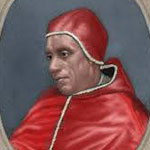
Pope Gregory XII was the 12th of the popes o use the Gregory name and the 205th leader in the history of the Church. Historians remember him as one of the only popes to abdicate the position, which he did a few years before his death. You can learn about why he left the papacy and other facts about Pope Gregory XII in this article.
Early Life
Known as Pope Gregory XII during his papacy, he previously used the name Angelo Corraro, which was sometimes spelled Corario. Born in either 1326 or 1327, he devoted himself to the Church from a young age. Angelo became the Bishop of Castello in 1380 and lived there for a decade before becoming the Latin Patriarch of Constantinople.
Pope Innocent VII would then make him a cardinal and a cardinal priest, which led to Angelo moving to San Marco. By the turn of the 15th century, he was back in Constantinople and working as an administrator on behalf of the pope.
Papal Election
Also known as the papal enclave of 1406, the papal election that years consisted of 15 bishops who opposed the idea of a Pope in Avignon. Benedict XIII named himself the antipope in 1394 and opposed both Pope Boniface IX and Pope Innocent VII. The bishops agreed to support Angelo if he would renounce Benedict as an antipope.
Angelo only agreed to the election if Benedict would renounce his papacy, which would give the bishops the chance to elect any man of their choosing. This led to the almost unanimous election of Pope Gregory XII.
Papacy
Angelo took his papal orders in November of 1406 and almost immediately met with Benedict to discuss the papacy. The King of Naples announced that he sided with Angelo who also had support from his wealthy family in Venice. The bishops who attended the Council of Pisa announced that they did not approve of either man and that Alexander V should be the next pope.
Council of Constance
Though Gregory was the official pope, he faced opposition from those who sided with Alexander and other men. This led to the pope appointing two men to speak for him to continue the idea that he was the supreme leader of the Church. Knowing that his time was limited and that there was much opposition, the pope decided to abdicate.
One of the cardinals he sent to the meeting announced that the pope planned to resign. The Council decided that Alexander was an antipope as was John XXIII who claimed the throne.
Death
After leaving the papal throne, Gregory began using the name Angelo again and moved to Ancona in central Italy. He lived there from his resignation on July 4, 1415, until his death on October 18, 1417, more than two years later. Angelo seldom spoke of his papacy and was quiet about his experience. Following Angelo’s death, he was buried in a local church.
List of Events In The Life of Pope Gregory XII
| Date | Age | Event | Title |
|---|---|---|---|
| 1327 | Born | ||
| 15 Oct 1380 | 53.7 | Appointed | Bishop of Castello, Italy |
| 21 Nov 1390 | 63.8 | Appointed | Titular Patriarch of Constantinople |
| 20 Apr 1395 | 68.3 | Appointed | Administrator of Coron (Coronea), Greece |
| 12 Jun 1405 | 78.4 | Elevated to Cardinal | |
| 12 Jun 1405 | 78.4 | Appointed | Cardinal-Priest of San Marco |
| 30 Nov 1406 | 79.9 | Elected | Pope (Roma, Italy) |
| 19 Dec 1406 | 79.9 | Installed | Pope (Roma, Italy) |
| 23 Oct 1409 | 82.8 | Resigned | Titular Patriarch of Constantinople |
| 4 Jul 1415 | 88.5 | Resigned | Pope (Roma, Italy) |
| 4 Jul 1415 | 88.5 | Appointed | Cardinal-Bishop of Frascati |
| 18 Oct 1417 | 90.7 | Died | Bishop Emeritus of Roma, Italy |
Quick Facts About Pope Gregory XII
- Angelo Corraro was born in Venice, which was then called the Republic of Venice.
- He was born circa 1326 or 1327 and in his early 80s when he accepted the papal throne.
- The pope died on October 18, 1417.
- Gregory lived in Ancona during his later years and passed away here of natural causes.
- His papacy began on November 30, 1406.
- The papacy of Pope Gregory XII ended on July 4, 1415.
- His successor was Pope Martin V.
Interesting Facts About Pope Gregory XII
- Pope Gregory XII was one of the only popes to ever resign from the papacy. He was the last pope to abdicate for nearly 600 years until Pope Benedict XVI stepped down in 2013. Unlike Gregory, Benedict received the title of pope emeritus upon stepping down.
- Though the bishops at the Council of Constance accepted his resignation and disposed of the antipope, they did not name the next pope. Martin V did not become the pope until November 11, 1417, more than two years after Gregory passed away.
- Gregory served during the Western Schism, which is a period when the Church had at least two men who claimed they were the true pope.
- The Catholic Church recognized Alexander V as a legitimate pope until the 1960s.
- He was one of the few popes born into a wealthy family who gave up status for the papacy.